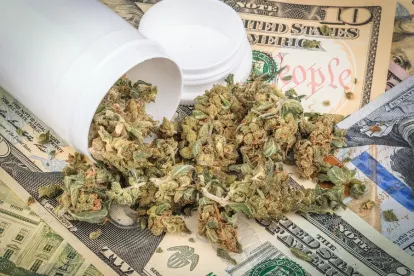On July 3, 2018, the New York State Department of Financial Services (DFS) issued guidance to New York chartered financial institutions encouraging banks to work with marijuana-related businesses. Motivated by the security threat facing New York’s budding legal cannabis industry, the DFS memo reinforced the state’s willingness to facilitate growth within the industry. So long as financial institutions implement stringent due diligence policies − while complying with both the 2014 Financial Crimes Enforcement Network (FinCEN) guidance and the guidance and priorities set forth in the 2013 memorandum issued by Deputy Attorney General James M. Cole (Cole Memo) − the DFS will not impose regulatory action on any New York State chartered bank or credit union “solely for establishing a banking relationship with a medical marijuana−related business that operates a compliant business in New York.”
In light of the rapidly evolving regulatory environment, complying with both federal and state regulations is no simple task.
New York’s Legal Cannabis Landscape
New York’s Compassionate Care Act
New York passed the Compassionate Care Act in 2014, legalizing medical marijuana and permitting registered physicians to recommend non-smokeable medical marijuana to certified patients for certain serious medical conditions. To meet patient needs for medical marijuana, the state awarded 10 licenses to Registered Organizations (ROs) permitting each RO to “acquire, possess, manufacture, sell, deliver, transport, distribute, or dispense” medical marijuana. Each RO can have up to four dispensing locations. The regulations also place stringent product quality standards, which can be found at 10 NYCRR 1004.11(k) and 1004.12(h).
Unlike the three-tiered alcohol beverage system employed in many states, New York’s medical marijuana businesses are vertically integrated, meaning ROs sell, manufacture and distribute medical marijuana. As of July 3, 2018, 10 ROs operate 22 dispensaries across the state.
Industrial Hemp
Under the New York Agriculture and Markets Law, New York authorized the cultivation of industrial hemp, which is defined as “the plant Cannabis sativa L. and any part of such plant, whether growing or not, with a delta-9 tetrahydrocannabinol (THC) concentration of not more than 0.3 percent on a dry weight basis.” The law clarifies that industrial hemp and derivative products are to be considered agricultural products that can be grown and produced in the state, and distributed or sold within and without of New York State as part of New York’s agricultural farm program.
Currently, the New York State Department of Agriculture and Markets (NYSDAM) has issued 123 permits to entities researching industrial hemp. The projects research the many uses of industrial hemp and hemp products, including “food, fiber, construction materials, energy storage, nutritional supplements, and personal care and wellness products.”
Federal Law and Guidance
The Cole Memo
Despite its legal status in 30 states, the federal Controlled Substance Act makes it a criminal act to manufacture, distribute or dispense marijuana. Recognizing the emergence of medical and recreational marijuana across the states, the Department of Justice issued the Cole Memo in August 2013, establishing the government’s position that it “should focus its resources on conduct that raised threats of criminal harm over and above merely operating in accordance with State Law.” The Cole Memo defined these threats as “enforcement priorities” that focused on preventing large-scale criminal enterprises relating to the sale of marijuana, preventing the sale of marijuana to minors and preventing drugged driving.
In January 2018, Attorney General Jeff Sessions rescinded the Cole Memo.
FinCEN Guidance and the Bank Secrecy Act
Although the Cole Memo was rescinded, its less well known but equally as important “cousin,” the FinCEN (Financial Crimes Enforcement Network) guidance, still remains in effect. In February 2014, FinCEN issued guidance to clarify expectations under the Bank Secrecy Act (BSA) for financial institutions seeking to provide services to marijuana-related businesses. The BSA requires U.S. financial institutions to assist government agencies in detecting and preventing money laundering. To achieve this goal, the BSA requires financial institutions to file suspicious activity reports (SARs) disclosing cash transactions exceeding $10,000.
The FinCEN guidelines make clear that a financial institution’s obligation to report suspected violations of federal law under the BSA is not affected by any state legalization of marijuana-related business activity. In determining whether financial institutions should provide services to marijuana-related businesses, the institution must engage in vigilant customer due diligence, ensuring the marijuana-related business complies with all applicable state laws.
Once the financial institution establishes a banking relationship with a marijuana-related business, it must file a SAR when required by the BSA because marijuana is still banned under federal law and “involves funds derived from illegal activity.” However, the FinCEN guidance creates new subsets of SARs specifically for working with marijuana-related businesses. Financial institutions should file a “Marijuana Limited” SAR, which is a less comprehensive filing. The information contained in a Marijuana Limited SAR is limited to names and addresses of the related parties, the fact that the SAR filing is solely because the subject is engaged in marijuana-related business and that no additional suspicious activity has been identified. If, however, the financial institution believes that the marijuana-related business implicates one of the Cole Memo priorities or violates state law, it should file a “Marijuana Priority” SAR.
Industrial Hemp
The 2014 U.S. Farm Bill (Section 7606 of the Agricultural Act of 2014) legalized the growing and cultivation of industrial hemp for research purposes in states where such growth and cultivation is legal, so long as the industrial hemp is grown and cultivated by an institution of higher education or under the auspices of a state agricultural pilot program. Similar to New York State, the federal government defines industrial hemp as any part of the cannabis plant with a THC concentration less than 0.3 percent on a dry weight basis. Importantly, industrial hemp is legal to import and ship across state lines and process into various products, including CBD oils, if it (1) contains less than 0.3% THC, (2) falls outside the definition of “marijuana” under the CSA and (3) is imported from a country where industrial hemp is legal.
New York State Department of Financial Services Guidance
Against this backdrop, the DFS issued guidance encouraging New York State chartered banks and credit unions to establish banking relationships with marijuana-related businesses legally operating in New York.
The guidance acknowledges the importance of medical marijuana as an effective substance to control chronic pain, alleviate certain side-effects of chemotherapy, manage epilepsy and address other serious medical conditions. It notes access to medical marijuana for these patients is hampered by lack of access to financial institutions for marijuana-related businesses, forcing these businesses to operate only with cash. It further observes operating a cash-only business puts employees and customers at risk for violent crime. The DFS determined the most effective method of eliminating this public safety concern is ensuring access to banks and credit unions for marijuana-related businesses in New York.
Relying on the FinCEN guidance, the DFS memo lays the groundwork for relationships between financial institutions and the medical marijuana industry. The DFS “will not impose any regulatory action on New York State chartered banks or credit unions solely for establishing a banking relationship with medical marijuana−related businesses” if the financial institution (1) complies with the 2014 FinCEN guidance, (2) complies with the Cole Memo’s “enforcement priorities” and (3) establishes its own stringent due diligence standards.
Similarly, the DFS encourages financial institutions to support the development of industrial hemp in New York State. An institution seeking to provide financial services to businesses that grow or cultivate industrial hemp “should assess and verify the eligibility and authority of the entity for participation in the research program, as authorized under the New York Agriculture and Markets Law.” The DFS guidance also requires the financial institution to conduct customer due diligence, which includes verifying that the industrial hemp customer complies with state law.
Navigating the Complex Regulatory Landscape without Being Left Behind
Initially slow to adopt the current trend of legalizing cannabis for medical and recreational use, due to Governor Andrew Cuomo’s recalcitrance, New York is quickly playing catch-up with its neighboring states. Shifts in public support for medical and recreation marijuana are forcing the New York State Assembly to expand the state’s medical marijuana program and to consider legalizing its recreational use. As recently as July 13, 2018, the New York State Department of Health released a detailed report recommending recreational adult use marijuana.
Despite this momentum, expansion of the medical marijuana industry has been stymied by its lack of access to financial institutions. These crossroads present exciting opportunities for New York’s banks and credit unions to capitalize on the state’s newfound willingness to facilitate growth in the industry.
Nevertheless, financial institutions should not underestimate the rigorous due diligence processes it must undertake to work with marijuana-related businesses. Although the DFS memo is a step in the right direction, financial institutions must fully understand the federal regulatory landscape and New York’s medical marijuana and industrial hemp laws.
To remain compliant when working with medical marijuana−related businesses, financial institutions should:
-
Ensure that the business does not implicate the “Enforcement Priorities” in the Cole Memo
-
Ensure that the business complies with all applicable New York State laws and regulations regarding medical marijuana
-
Comply with FinCEN’s due-diligence requirements, which include verifying with the New York State Department of Health that the business is an RO; reviewing the business’s license application and related documents submitted for becoming an RO; understanding the normal and expected activity of the RO; and continually monitoring publicly available sources of adverse information about the RO
-
File SARs, Marijuana Limited SARs or a SAR for Termination, as required by the Bank Secrecy Act and detailed in the FinCEN guidance.
When working with businesses that cultivate or grow industrial hemp, financial institutions should conduct due diligence to ensure that the business was properly licensed under the New York State licensing system, that it has a proper research plan and that it employs appropriate security measures.



 />i
/>i

